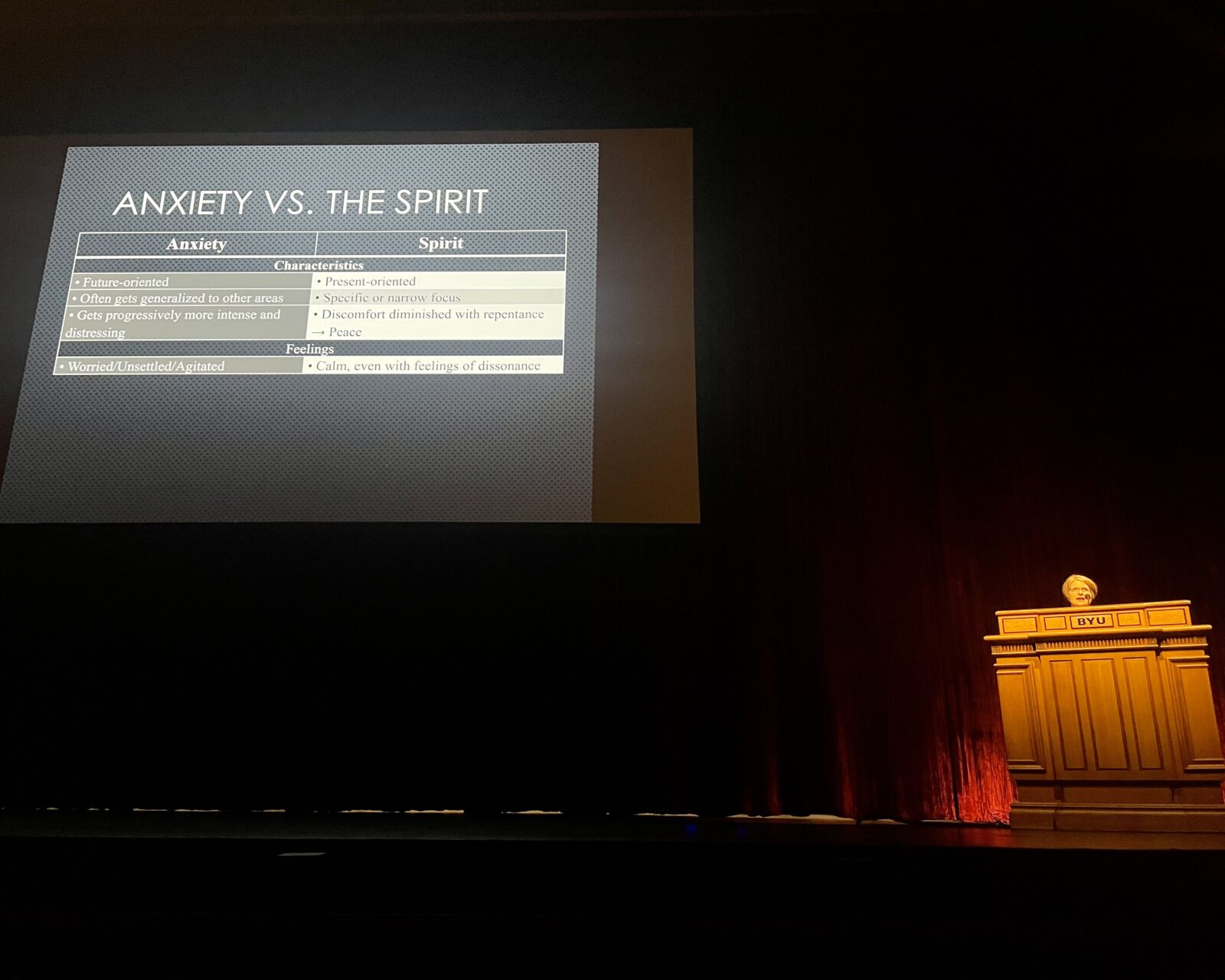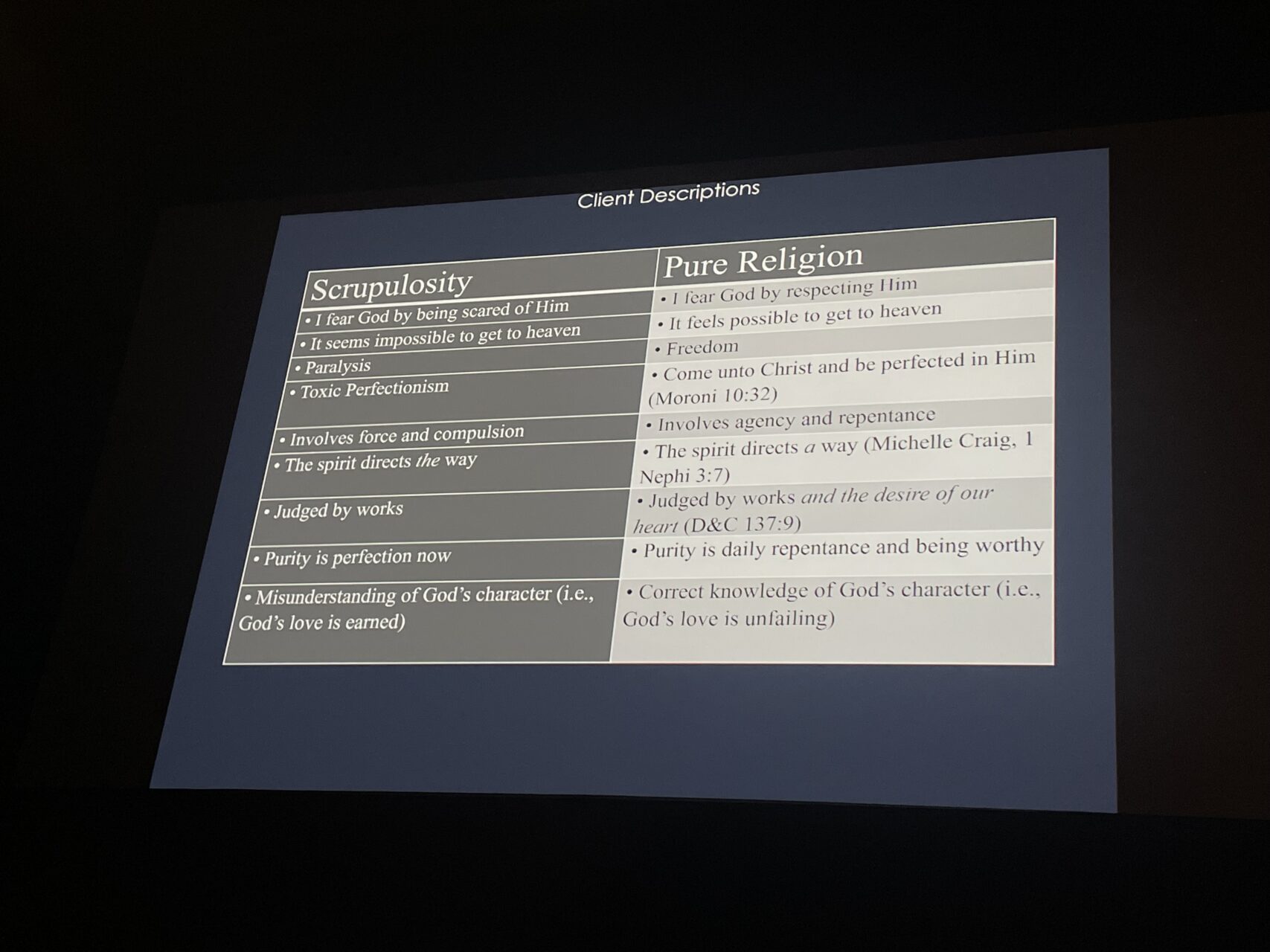
Debra Theobald McClendon, a clinical psychologist with training in marriage and family therapy, gave an Education Week class on Wednesday about feelings of anxiety, toxic perfectionism and religious OCD, in contrast with feeling the Spirit.
The Spirit vs. anxiety
McClendon said certain levels of anxiety can actually be spiritually motivating. “Moderate levels of anxieties can motivate you to more consciously study the gospel, to invite the spirit in your heart, and be more curious,” McClendon said.
However, anxiety can quickly become damaging when levels get too high and individuals are unable to cope. “This can cause spiritual impairment,” McClendon said. “It’s difficult and sometimes impossible to discern God’s love.”
McClendon mentioned that some of her clients who have experienced high levels of anxiety have expressed concerns such as thinking that they don’t feel God and that God doesn’t love them.
She explained how our bodies produce stress hormones which disrupt and compete with our ability to feel the Spirit.
McClendon showed several slides with charts detailing the differences between feelings of anxiety and feeling the Spirit. She explained how it is important to be able to discern between the two so we can avoid developing toxic religious habits caused by excessive anxiety.
She added that revelation is a developmental process. When anxiety is high, revelation might seem like it is supposed to be quick and sudden. “Spiritual promptings are not impulsive,” McClendon said.
Toxic perfectionism
McClendon clarified the differences between adaptive and toxic perfectionism. She described someone with adaptive perfectionism as having a perspective focused on goal-setting, where they work hard and are resilient when certain goals are hard to reach.
On the other hand, toxic perfectionism encourages an unhealthy lifestyle. “You can never win with this life approach,” McClendon said.
“Either way, someone with toxic perfectionism will lose,” she explained. “If they don’t meet their standard, they will think, ‘I’m not good enough,’ and if they do meet their standard, they think, ‘My goals weren’t high enough.’”
McClendon provided a comforting thought from President Russell M. Nelson’s October 1995 General Conference talk, Perfection Pending. He shared how the term “perfect” is used in the scriptures, but has a different meaning than what we might be familiar with. “Perfect” comes from the Greek “teleios,” which means “complete.” The infinitive form of the verb is “teleiono,” which means “to reach a distant end.”
McClendon emphasized that from this definition, people learn they are not asked to be free of error, but they are expected to be striving toward a distant objective.

Religious OCD
“In OCD or Obsessive Compulsive Disorder, anxiety takes on an extreme, destructive nature and creates an even greater deficit in cognitive flexibility,” McClendon said. She also said someone with OCD has obsessions, which are unwanted, repetitive and distressing thoughts. These are accompanied by compulsions, which are repetitive behaviors that are done in an attempt to combat the anxiety caused by the obsession.
Religious OCD is called scrupulosity, which means the content of the distressing thoughts are of a religious nature. “It’s an overuse or over-application of religious principles,” McClendon said. “It takes anxiety and bullies its way into religious belief and personal worship.” This creates toxic guilt and pathological fears, such as disappointing God or having impure intentions.
“The nature of God is good, but these individuals come to intensely fear God and see Him as a rigid and malicious dictator looking for the smallest of reasons to condemn them,” McClendon said.
She stated that in healthy faith, personal worship consists of creating peace and feelings of connection with the spirit. With anxiety, it is done out of fear of punishment. “Those who struggle with scrupulosity have all the pains of a damned soul, but none of the relief of a saved soul.”
She briefly discussed how treatment for these struggles can come in multiple forms. This includes doctrinal clarification and help with spiritual concepts as well as formal treatment, such as therapy to aid in improving cognitive flexibility.
McClendon ended her class reminding the audience that “Our Father is not interested in finding reasons to condemn us, He wants to exalt us.”




